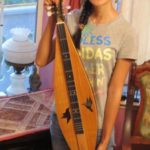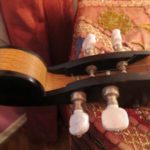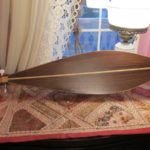2.97 – 2009 Richard Turner – 4 String Teardrop – £295 no case
Richard was a classical guitarist who taught for many years at California State University (Fullerton). Now retired, he lives in Hot Springs, Arkansas. He has apparently made a number of custom guitars and dulcimers.
Hummingbird-shaped label, handwritten: “1-09 Richard Turner”. Apparently a handmade one-off, but using quality materials and showing excellent workmanship. Indian rosewood sides and bookmatched back with central purfling strip, fine-grained spruce top – possibly Engelman spruce. The body is fully bound using a two-colour purfling strip of maple and an unidentified brown wood. The fingerboard is routed underneath and made of oak with a thick ebony overlay, and has MoP markers at frets 3, 5, 7 and 10. 6+ and 13+ frets are present and correct. The pegbox and large scroll are also white oak, but faced with an unidentified black (or black-stained) wood with some brown flecks – possibly ebony?. Tuners are 5 Star geared banjo pegs. The soundholes designs are both large hummingbirds, but each is slightly different. There is a bone nut and quite chunky floating bone bridge. The anchor pins are large and nickel-plated. The black-and-white theme is nicely rounded off with an ebony (?)/oak sandwich tail block. The body is well lined inside and some support provided for the large soundholes. Unfortunately this has not prevented two shortish, hairline cracks developing from one soundhole – still visible but now stabilised. Overall length 37½”, upper bout/lower bout 8″, depth 2+”, FBW 1½”, VSL 27½” (medium scale), weight 2lb 10oz (1188g), original (?) strings 12/12, 12, 23w, now 12, 15, 23w. 6+ and 13+ frets.
Although the overall design is not ground-breaking, the dulcimer looks well balanced and attractive; Richard has used high quality materials and hardware; and most importantly, he has built it well, showing excellent attention to detail. It sounds clear, quite sweet and rounded, as you would expect from the materials, but not aggressive or bass-heavy, as could have been the case with such a wide body. If you’re being hyper-critical, the intonation is not quite perfect for DAD, better for DAA. More work to compensate the bridge might pay dividends – once the owner has decided the predominant tuning to be used. You just cannot buy quality workmanship and sound at this price.
Click on thumbnails below to enlarge.



